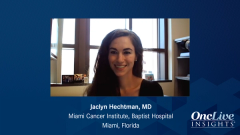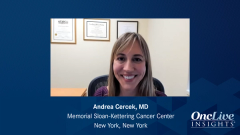
Individualizing Therapy in HER2+ Metastatic Colorectal Cancer
Dr Jaclyn Hechtman presents the profile of a patient with HER2+ metastatic colorectal cancer and has a conversation with Dr Andrea Cercek on how to personalize frontline therapy selection in each patient.
Episodes in this series

Jaclyn Hechtman, MD: Andrea, I have a case that I want to discuss with you. A 50-year-old man presented his primary care provider with bright-red blood per rectum and changes in bowel habits for 6 months. He was referred to a gastroenterologist for a colonoscopy, which unfortunately found an obstructing mass in the rectum of the sigmoid colon and was diagnosed as poorly differentiated adenocarcinoma. It’s stage IV.
In addition to the PET [positron emission tomography] CT scan showing FDG [fluorodeoxyglucose] avidity of the hypermetabolic sigmoid colon mass, there were liver metastases as well as retroperitoneal lymphadenopathy. Molecular testing was done on the tumor, and it showed a microsatellite stable tumor. It was RAS-BRAF wild type, and the HER2 [human epidermal growth factor receptor 2] IHC [immunohistochemistry] was 3+. The patient received FOLFOX [5-fluorouracil, leucovorin, oxaliplatin] plus bevacizumab and then progressed and received trastuzumab plus pertuzumab.
Which factors affect treatment choice in the metastatic setting? How do you individualize therapy when looking at a patient like this?
Andrea Cercek, MD: It’s always important to take a bunch of factors into consideration before starting therapy. We think about our patient characteristics, not necessarily the age of the patient but the physical fitness, or what we call performance status—how symptomatic they are from their disease. Are they weakened by it? Do they show signs and symptoms of the disease? This particular patient was 50 years old and just had red blood per rectum, with no other mention of significant effects of disease burden.
Then there are things like patient preference. What does the patient want? You always have to talk to the patient and discuss that this is an advanced disease and in multiple locations. Most likely the therapy is not curative. It’s very treatable, however, so we try to treat the disease as best as we can with the options we have available. Once we learn more about your particular tumor, we keep going. The further we go, the better our treatment options will be. That’s the general approach, but it’s always important to talk with patients about the reality of the situation. Some people may prefer to be more or less aggressive, and it’s a mutual decision. We always have to lay out all the treatment options.
Then [we look at] the biology of the tumor: tumor location, tumor characteristics, and the molecular characteristics. In this case, we look at the location. In colon cancer, location really makes a difference. We know a bit in terms of prognosis, but we don’t necessarily change treatment for that with backbone chemotherapy. Patients who have a left-sided descending colon and rectal tumors can benefit from anti-EGFR therapy if they’re RAS type, but right-sided tumors do not. That kind of backbone, that addition of a biologic to the chemotherapy backbone, matters with tumor location. The symptoms [are also important]. This patient had a rectal tumor, which is oftentimes painful and bleeding. We try to start therapy as quickly as possible in those instances.
Then we talk to our pathologist and ask for guidance in terms of the pathological findings in the tumor, not so much in metastatic disease. In terms of high-risk features and low-risk features, that matters a bit more in resected disease in stage II or III, but what are the characteristics? What are the molecular genomics? And in left-sided tumors, what is the HER2 status?
Can you tell me a little about this tumor? Can I use anti-EGFR therapy? It’s left-sided, and there are good data for left-sided tumors as first-line therapy with the addition of anti-EGFR therapy to the chemotherapy backbone. Can I do that in this case with HER2IHC 3+ or a RAS BRAF wild-type tumor?
Jaclyn Hechtman, MD: There have been some data out there. When we say HER2 IHC 3+, we’re telling you that it’s positive for HER2overexpression. On a scale with 0, 1, 2, and 3, for how HER2 protein is expressed, 0 means there’s no reactivity for the HER2antibody. There’s noHER2 expression: +1 staining is negative. It was seen only at a very high power. It’s very weak: +2 is equivocal, meaning we’ll reflect those cases to FISH [fluorescent in situ hybridization]. It’s often visible at 10X magnification. When we see 3+, it’s positive for HER2 overexpression, which correlates withHER2 amplification. When we have these tumors, when we bring that anti-EGFR, there have been some data that when there’s HER2 amplification, they don’t respond as well. Cause is definitely associated with primary resistance to anti-EGFR therapy. I caution the oncologists about looking at that and what options there are for someone who’s overexpressingHER2 on her tumor. It doesn’t have other mitogen-activated protein kinase pathway alterations.
Andrea Cercek, MD: That’s why—very appropriately, in this case—this patient received FOLFOX [5-fluorouracil, leucovorin, oxaliplatin] plus bevacizumab because of the HER2 amplification, as opposed to the anti-EGFR therapy, which we typically think about in a left-sided rectal tumor. In this patient, would you encourage HER2 testing before starting first-line therapy? In this case, it was done perhaps in first-line therapy or maybe later, but they certainly had the information available for the second decision point of second-line therapy.
Jaclyn Hechtman, MD: It’s definitely something that’s important to know up front. You can plot this patient out because of this HER2positivity, so we’re going to skip the anti-EGFR and look at what else is available. One reason to have it up front is to have this knowledge available. Often these patients with metastatic colon cancer will respond for a period of time, and you’ll inevitably need this knowledge. Rather than go back and look for the tissue and test and do all this, it’s up front. It’s in the patient’s record. It’s there when it will be needed for stage IV disease. That’s the beauty of doing it up front. We can say that down the line, this isn’t the best option, or this is, or we can continue looking for which option is best because of the knowledge that you have up front.
Andrea Cercek, MD: I agree completely. You just have a much better plan of attack if you know which strategies you can utilize at what time and with which combinations. Ideally, up front is best.
Transcript edited for clarity.






































